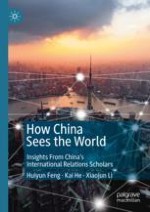2019 | OriginalPaper | Chapter
2. On China’s Power and the International Order: Is China a Challenger?
Authors : Huiyun Feng, Kai He, Xiaojun Li
Published in: How China Sees the World
Publisher: Springer Singapore
Activate our intelligent search to find suitable subject content or patents.
Select sections of text to find matching patents with Artificial Intelligence. powered by
Select sections of text to find additional relevant content using AI-assisted search. powered by
